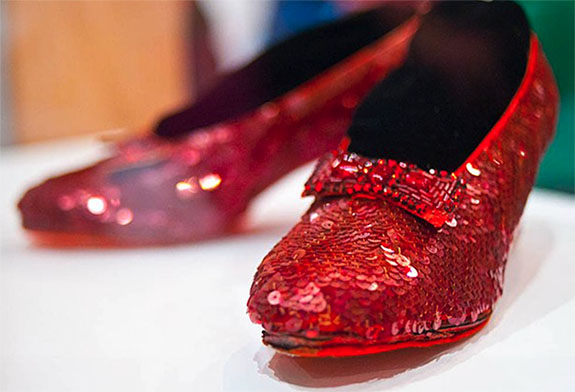Man Who Intended to Liquidate 'Gems' From Ruby Slippers to Get No Prison Time
The man who pleaded guilty in October to stealing a pair of Ruby Slippers from the Judy Garland Museum in 2005 — and then ditching them when he discovered the footwear's embellishments included no precious gemstones — will be spared prison time due to his fading health.

In May of 2023, a federal grand jury returned an indictment against 76-year-old Minnesota resident Terry Martin for snatching the shoes worn by Dorothy in the 1939 MGM film, The Wizard of Oz, from the Grand Rapids, MN, museum after closing time in a smash-and-grab event. There was no surveillance video of the crime, and the only clue left behind was a single red sequin amidst a sea of shattered plexiglass.
Martin said he used a sledgehammer to break through the museum doors and smash a case holding the slippers. He also claimed that he transferred the stolen items to a fence after coming to the realization that the famous "Ruby Slippers" contained no actual rubies. Attorney Dane DeKrey reportedly argued in court that Martin's involvement with the slippers spanned just a two-day period in 2005.
MGM’s chief costume designer Gilbert Adrian had created multiple pairs of Ruby Slippers to be worn by the 16-year-old Garland during the filming, but only four pairs are known to still exist. Each of the pairs is believed to be worth $3 million or more if ever offered at auction.
The prop designer's original intention was to use bugle beads to simulate ruby, but they proved to be too heavy. Instead, most of the bugle beads were replaced with sequins, 2,300 on each slipper. The butterfly-shaped bow on the front of each shoe features red bugle beads outlined in red glass rhinestones in silver settings.
The case finally broke in the summer of 2017, when an individual approached the company that had originally insured the slippers for $1 million and said he had information on how they could be returned. After a yearlong investigation coordinated by FBI field offices in Chicago, Atlanta and Miami, the slippers were recovered during an undercover operation in Minneapolis.
In court documents released on January 4, 2024, prosecutors recommended no prison time in the Ruby Slippers heist, citing Martin's fragile condition. The defendant is suffering from chronic COPD, requires oxygen at all times, is homebound and confined to a wheelchair.
“Given that Martin is already immobilized, the United States recommends no detention or house arrest be imposed,” the prosecutors wrote in a presentence investigation report (PSIR).
“The offense is a serious one. As far as thefts go, Martin’s violation was disgraceful. After all, Martin targeted and stole rare and valuable pieces of Americana with the intent to destroy them and liquidate them for their gemstones," reads the PSIR. "Once Martin realized his error, he transferred the ruby slippers to a fence, presumably recognizing the difficulty of selling well-known artwork.”
The stolen Ruby Slippers actually belonged to Hollywood memorabilia collector Michael Shaw, who had loaned them to the Judy Garland Museum. The collector reportedly told CBS in 2018 that the shoes were in pristine condition when he got them back.
Before announcing the recovery in 2018, the FBI had sent the sequined shoes to the Smithsonian for verification. A similar pair of Ruby Slippers has been one of the most popular attractions at the National Museum of American History in Washington, DC.
The pair had been pulled from its exhibit in 2016 to undergo conservation care funded by a Kickstarter campaign. Smithsonian objects conservator Dawn Wallace had spent more than 200 hours examining the slippers and was intimately familiar with every detail.
Wallace confirmed that the FBI’s pair was, in fact, authentic, but in a surprising turn of events revealed that the pair that had been donated anonymously to the Smithsonian in 1979 was mismatched. The left and right shoes were of different sizes. The heel caps and bows on each shoe were not identical.
What’s more striking is that the FBI’s recovered pair had the same issues. When the four shoes were laid side by side, two identical pairs were temporarily united.
The Smithsonian believes that the mix-up may have occurred in the run-up to a 1970 auction of MGM costumes and memorabilia. That’s when the Smithsonian’s pair was originally obtained and could have been confused with the other pair because all four shoes had felt bottoms and were intended for dance sequences.
Credit: Image by Chris Evans from same, United States, CC BY 2.0, via Wikimedia Commons.

In May of 2023, a federal grand jury returned an indictment against 76-year-old Minnesota resident Terry Martin for snatching the shoes worn by Dorothy in the 1939 MGM film, The Wizard of Oz, from the Grand Rapids, MN, museum after closing time in a smash-and-grab event. There was no surveillance video of the crime, and the only clue left behind was a single red sequin amidst a sea of shattered plexiglass.
Martin said he used a sledgehammer to break through the museum doors and smash a case holding the slippers. He also claimed that he transferred the stolen items to a fence after coming to the realization that the famous "Ruby Slippers" contained no actual rubies. Attorney Dane DeKrey reportedly argued in court that Martin's involvement with the slippers spanned just a two-day period in 2005.
MGM’s chief costume designer Gilbert Adrian had created multiple pairs of Ruby Slippers to be worn by the 16-year-old Garland during the filming, but only four pairs are known to still exist. Each of the pairs is believed to be worth $3 million or more if ever offered at auction.
The prop designer's original intention was to use bugle beads to simulate ruby, but they proved to be too heavy. Instead, most of the bugle beads were replaced with sequins, 2,300 on each slipper. The butterfly-shaped bow on the front of each shoe features red bugle beads outlined in red glass rhinestones in silver settings.
The case finally broke in the summer of 2017, when an individual approached the company that had originally insured the slippers for $1 million and said he had information on how they could be returned. After a yearlong investigation coordinated by FBI field offices in Chicago, Atlanta and Miami, the slippers were recovered during an undercover operation in Minneapolis.
In court documents released on January 4, 2024, prosecutors recommended no prison time in the Ruby Slippers heist, citing Martin's fragile condition. The defendant is suffering from chronic COPD, requires oxygen at all times, is homebound and confined to a wheelchair.
“Given that Martin is already immobilized, the United States recommends no detention or house arrest be imposed,” the prosecutors wrote in a presentence investigation report (PSIR).
“The offense is a serious one. As far as thefts go, Martin’s violation was disgraceful. After all, Martin targeted and stole rare and valuable pieces of Americana with the intent to destroy them and liquidate them for their gemstones," reads the PSIR. "Once Martin realized his error, he transferred the ruby slippers to a fence, presumably recognizing the difficulty of selling well-known artwork.”
The stolen Ruby Slippers actually belonged to Hollywood memorabilia collector Michael Shaw, who had loaned them to the Judy Garland Museum. The collector reportedly told CBS in 2018 that the shoes were in pristine condition when he got them back.
Before announcing the recovery in 2018, the FBI had sent the sequined shoes to the Smithsonian for verification. A similar pair of Ruby Slippers has been one of the most popular attractions at the National Museum of American History in Washington, DC.
The pair had been pulled from its exhibit in 2016 to undergo conservation care funded by a Kickstarter campaign. Smithsonian objects conservator Dawn Wallace had spent more than 200 hours examining the slippers and was intimately familiar with every detail.
Wallace confirmed that the FBI’s pair was, in fact, authentic, but in a surprising turn of events revealed that the pair that had been donated anonymously to the Smithsonian in 1979 was mismatched. The left and right shoes were of different sizes. The heel caps and bows on each shoe were not identical.
What’s more striking is that the FBI’s recovered pair had the same issues. When the four shoes were laid side by side, two identical pairs were temporarily united.
The Smithsonian believes that the mix-up may have occurred in the run-up to a 1970 auction of MGM costumes and memorabilia. That’s when the Smithsonian’s pair was originally obtained and could have been confused with the other pair because all four shoes had felt bottoms and were intended for dance sequences.
Credit: Image by Chris Evans from same, United States, CC BY 2.0, via Wikimedia Commons.

